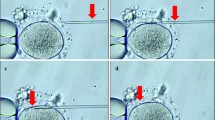Abstract
Purpose
We explored the possibility of employing intracytoplasmic sperm injection (ICSI), involving oocytes and sperm of owl monkeys, to increase the availability of this species for investigations relating to malaria, etc., by increasing the number of animals in our laboratory.
Methods
Two owl monkeys (a female and a male), raised at the Amami Laboratory of the University of Tokyo, were used. Follicular oocytes surrounded with cumulus cells were cultured in vitro for approximately 25 h and cumulus cells were removed with 0.1 % hyaluronidase. Because of the poor motility of caudal epididymal sperm, sperm were injected without adding polyvinylpyrrolidone to immobilize them. The ICSI procedure was performed by an individual with considerable experience of human ICSI.
Results
We were able to produce two owl monkey embryos using ICSI of oocytes that matured to MII stage. Both embryos reached the 10-cell stage at 98 h after ICSI and showed signs of compaction, but failed to cleave further.
Conclusions
Although we successfully produced owl monkey embryos after ICSI, the embryos did not develop to the blastocyst stage. Many parameters need to be studied further, including superovulation, selection of culture media, and selection of good quality sperm in order to achieve successful ICSI in the owl monkey.



Similar content being viewed by others
References
Geiman QM, Meagher MJ. Susceptibility of a New World monkey to Plasmodium falciparum from man. Nature. 1967;1967(215):437–9.
Nakazato C, Yoshizawa M, Isobe K, Kusakabe KT, Kuraishi T, Hattori S, et al. Morphological characterization of spermatozoa of the night mokey. J Mamm Ova Res. 2015;32:37–40.
Matsumoto T, Isobe K, Kusakabe KT, Kuraishi T, Hattori S, Nakazato C, et al. Morphological characterization and in vitro maturation of follicular oocytes from the owl monkey (Aotus Lemurinus). J Mamm Ova Res. 2015;32:103–8.
Palermo G, Joris H, Devroey P, Van Steirteghem AC. Pregnancies after intracytoplasmic injection of single spermatozoon into an oocyte. Lancet. 1992;340:17–8.
Hosoi Y, Torii R, Fujinami N, Matsumoto K, Saeki K, Iritani A. Fertilization by intracytoplasmic sperm injection and subsequent embryo development in vitro blastocysts in Japanese monkey (Macaca fuscata). J Mamm Ova Res. 2003;20:34–40.
Araki Y, Yoshizawa M, Araki Y. A novel method for chromosome analysis of human sperm using enucleated mouse oocytes. Hum Reprod. 2005;20:1244–7.
Hewitson L, Takahashi D, Dominko C, Simeriy C, Shatten G. Fertilization and embryo development to blastocysts after intracytoplasmic sperm injection in the rhesus monkey. Hum Reprod. 1998;13:3449–55.
Nusser KD, Mitalipov S, Widmann A, Gerami-Naini B, Yeoman RR, Wolf DP. Developmental competence of oocytes after ICSI in the rhesus monkey. Hum Reprod. 2001;16:130–7.
Zhang L, Weston AM, Denniston RS, Goodesux LL, Gogke RA, Wolf DP. Developmental potential of rhesus monkey embryos produced by in vitro fertilization. Biol Reprod. 1994;51:433–40.
Benchaib M, Braun V, Lornage J, Hadj S, Salle B, Lejeune H, et al. Sperm DNA fragmentation decreases the pregnancy rate in an assisted reproductive technique. Hum Reprod. 2003;18:1023–8.
Lopes S, Sun JG, Jurisicova A, Meriano J, Casper RF. Sperm deoxyribonucleic acid fragmentation is increased in poor-quality semen samples and correlates with failed fertilization in intracytoplasmic sperm injection. Fertil Steril. 1998;69:528–32.
Muriel L, Garrido N, Fernández JL, Remohí J, Pellicer A, de los Santos MJ, et al. Value of the sperm deoxyribonucleic acid fragmentation level, as measured by the sperm chromatin dispersion test, in the outcome of in vitro fertilization and intracytoplasmic sperm injection. Fertil Steril. 2006;85:371–83.
Acknowledgments
We thank Emeritus Professor Lynn R. Fraser of King’s College London for reading this manuscript. This study was supported partly by the Grant for Joint Research Project (2013-328) of the Institute of Medical Science, The University of Tokyo.
Author information
Authors and Affiliations
Corresponding author
Ethics declarations
Conflict of interest
All authors declare that they have no conflict of interest.
Human studies
This article does not contain any studies with human subjects performed by any of the authors.
Animal studies
All institutional and national guidelines for the care and use of laboratory animals were followed.
About this article
Cite this article
Watanabe, H., Matsumoto, T., Nishi, M. et al. Intracytoplasmic sperm injection into oocytes matured in vitro and early embryonic development in the owl monkey (Aotus lemurinus). Reprod Med Biol 15, 183–186 (2016). https://doi.org/10.1007/s12522-015-0229-1
Received:
Accepted:
Published:
Issue Date:
DOI: https://doi.org/10.1007/s12522-015-0229-1




